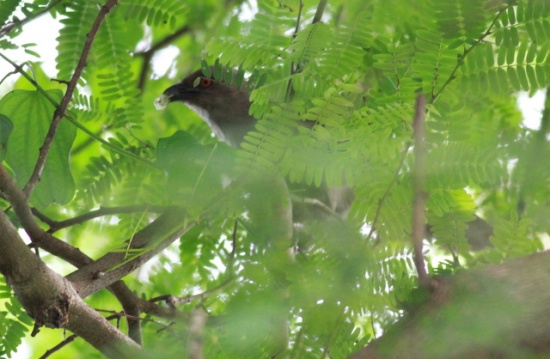m |
(completed) |
||
| Line 1: | Line 1: | ||
| − | |||
[[Image:AndamanCoucal.jpg|thumb|550px|right|Photo by {{user|Goyter|Goyter}}<br />Andamans, [[India]], November 2012]] | [[Image:AndamanCoucal.jpg|thumb|550px|right|Photo by {{user|Goyter|Goyter}}<br />Andamans, [[India]], November 2012]] | ||
'''Alternative name: Brown Coucal''' | '''Alternative name: Brown Coucal''' | ||
;[[:Category:Centropus|Centropus]] andamanensis | ;[[:Category:Centropus|Centropus]] andamanensis | ||
==Identification== | ==Identification== | ||
| + | 45 - 48cm. The only Coucal in its range. | ||
| + | * Grey-buff head, mantle and underparts | ||
| + | * Rufous-purple back and wings, tips darker bronze, grey-buff wing-linings | ||
| + | * Bronzy-purple tail | ||
| + | * Red-brown to yellow eye | ||
| + | * Black bill and feet | ||
| + | Females are larger. Juveniles are finely barred above and below. | ||
==Distribution== | ==Distribution== | ||
| − | [[Andaman Islands]] of [[India]], and adjacent Table, Great and Little Coco islands, [[Myanmar]]. | + | Endemic to the [[Andaman Islands]] of [[India]], and adjacent Table, Great and Little Coco islands, [[Myanmar]].<br /> |
| + | Common in its small range. | ||
==Taxonomy== | ==Taxonomy== | ||
| − | + | This is a [[Dictionary_M-S#M|monotypic]] species.<br /> | |
| − | |||
Some authors consider this to be a subspecies of [[Greater Coucal]]<sup>[[#References|[2]]]</sup> | Some authors consider this to be a subspecies of [[Greater Coucal]]<sup>[[#References|[2]]]</sup> | ||
==Habitat== | ==Habitat== | ||
| Line 14: | Line 20: | ||
==Behaviour== | ==Behaviour== | ||
====Diet==== | ====Diet==== | ||
| − | + | Feeds on grasshoppers, other insects and small arthropods. | |
====Breeding==== | ====Breeding==== | ||
| − | The nest is a large globe made of twigs and leaves. | + | Breeding season from February to July. The nest is a large globe made of twigs and leaves. Lays 2 to 3 eggs. |
| + | ====Movements==== | ||
| + | This is a resident species. | ||
==References== | ==References== | ||
| − | #{{Ref- | + | #{{Ref-Clements6thAug13}}#{{Ref-HBWVol4}}#Avibase |
| − | |||
{{ref}} | {{ref}} | ||
| − | |||
==External Links== | ==External Links== | ||
{{GSearch|Centropus+andamanensis}} | {{GSearch|Centropus+andamanensis}} | ||
*[http://www.orientalbirdimages.org/birdimages.php?action=birdspecies&Bird_ID=468&Bird_Image_ID=87&Bird_Family_ID=80 View more images of this species on Orientalbirdimages] | *[http://www.orientalbirdimages.org/birdimages.php?action=birdspecies&Bird_ID=468&Bird_Image_ID=87&Bird_Family_ID=80 View more images of this species on Orientalbirdimages] | ||
| − | [[Category:Birds]] [[Category:Centropus | + | [[Category:Birds]] [[Category:Centropus]] |
Revision as of 13:49, 7 October 2013
Alternative name: Brown Coucal
- Centropus andamanensis
Identification
45 - 48cm. The only Coucal in its range.
- Grey-buff head, mantle and underparts
- Rufous-purple back and wings, tips darker bronze, grey-buff wing-linings
- Bronzy-purple tail
- Red-brown to yellow eye
- Black bill and feet
Females are larger. Juveniles are finely barred above and below.
Distribution
Endemic to the Andaman Islands of India, and adjacent Table, Great and Little Coco islands, Myanmar.
Common in its small range.
Taxonomy
This is a monotypic species.
Some authors consider this to be a subspecies of Greater Coucal[2]
Habitat
Moist lowland forests and mangrove forests.
Behaviour
Diet
Feeds on grasshoppers, other insects and small arthropods.
Breeding
Breeding season from February to July. The nest is a large globe made of twigs and leaves. Lays 2 to 3 eggs.
Movements
This is a resident species.
References
- Clements, J. F., T. S. Schulenberg, M. J. Iliff, B.L. Sullivan, C. L. Wood, and D. Roberson. 2013. The eBird/Clements checklist of birds of the world: Version 6.8., with updates to August 2013. Downloaded from http://www.birds.cornell.edu/clementschecklist/download/
- Del Hoyo, J, A Elliot, and J Sargatal, eds. 1997. Handbook of the Birds of the World. Volume 4: Sandgrouse to Cuckoos. Barcelona: Lynx Edicions. ISBN 978-8487334221
- Avibase
Recommended Citation
- BirdForum Opus contributors. (2024) Andaman Coucal. In: BirdForum, the forum for wild birds and birding. Retrieved 11 May 2024 from https://www.birdforum.net/opus/Andaman_Coucal




